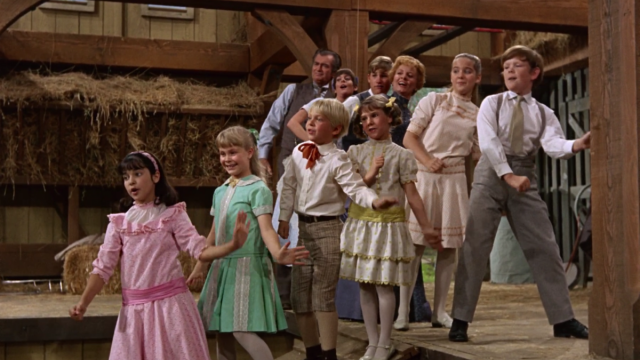This is Goldie Hawn’s first movie. While it also features Kurt Russell (though he barely has any lines), she doesn’t remember meeting him. This is hardly surprising. Since she’s five years older than he is, to her, he was a child at the time. (She was in her early twenties and he was in his teens.) If they hadn’t later gotten together, the appearance together in a scene where neither has lines and they don’t interact wouldn’t be notable in any way, any more than the fact that this was her only appearance with Lesley Ann Warren. And they actually interact, in Hawn’s only scene.
This is based on the true story of the Bower family, though how loosely, I cannot tell you. In 1888, they are practicing a campaign song for Grover Cleveland in the hopes of performing it at the Democratic National Convention. Grandfather Renssaeler Bower (Walter Brennan) is a Confederate veteran and a staunch Democrat. His son Calvin (Buddy Ebsen) is a Republican but more interested in making music than his father’s politics. Anyway, granddaughter Alice (Warren) has a new suitor, Joe Carder (John Davidson), and he persuades the family to go to the Dakotas instead. From there, they get entangled in the local statehood debate.
It’s fascinating to me that Renssaeler accuses Calvin of treason for proposing a government for the Dakotas if the US government won’t give them statehood. Because, let’s be real, Grandpa (as we’ll call him from now on so I don’t have to keep spelling “Renssealer”) actually literally was a traitor. It would work better for me if he said something like, “I was wrong to rebel against my government,” but former Confederates in movies never do say that. In fact, he goes on in one scene about “the War Between the States” and so forth. Movie treatment of the Confederacy never ceases to bewilder me.
On the other hand, I’m not thrilled with Joe Carder’s explicit hopes of keeping Democrats out of the Dakota territories. His description of them doesn’t get into the very real problems of the Democratic Party of the time and actually felt to me to have its own racial dogwhistle issues—IMDb doesn’t provide the quote, and I don’t feel like searching the movie for it, but some of what he says feels to me as though he’s secretly hoping to keep Jews out of the territory. I’m certain that’s not what the screenwriters intended, and I can’t quite tell you why it felt that way, since the only specific word I can remember from the speech is “shyster.” Maybe it’s my awareness of redlining practices in the North in the century after the movie is set. But it’s certainly a Those People situation.
This movie was where I first learned you could win the popular vote and still lose an election, when I was a child. For years, I had no memory of what movie that information was from, but I had a very clear memory of the ending of this movie, wherein two characters have bet on the election outcome and find that the winner of that bet is not who they thought it would be. (Interestingly, literally every time the Electoral College has decided the election, it has been the Republican over the Democrat. Even in the days when the parties’ positions were literally the exact opposite of where they are now.) Actually, I long believed I hadn’t seen this movie until I watched it again and got to the ending.
Am I talking more about the movie’s politics than its plot? That’s okay; so is the movie. The romance between Alice and Joe is hemmed about by political considerations; when she tries to prove she doesn’t care about him after all, she deliberately allows herself to be courted by a Democrat. Her family’s politics are the consideration in keeping her from teaching school—which consequently means there is no school, as there is no other qualified teacher. John Davidson isn’t a bad game show host, but I never have understood Disney’s determination in those days to make him a romantic lead, especially as he and Warren have no chemistry.
We certainly don’t ever really understand why the family hauls off and goes to the Dakotas rather than perform at the convention. Katie Bower (Janet Blair) has a talk with Calvin about the prospect of going, and they go sooner rather than later since all the best land will be claimed first, but since they’re explicitly concerned about the boys’ prospects for homesteads, and the oldest boy is Kurt Russell as Sidney, aren’t the boys going to have to wait as much as ten years to pick out their homesteads anyway? Obviously, the family did decide to move, as this is, as I said, based on a biography (by daughter Laura, played here by Pamelyn Ferdin), but the movie doesn’t tell us why.
It’s all very heartwarming that Calvin and his father are able to live together and get along despite their politics; Katie has a house rule that there is to be no political discussion in the house. But the family starts out in Missouri. Yes, it’s nearly thirty years after the Civil War; presumably Calvin was still a boy then and didn’t have to choose sides. However, it does point to a time when “we just don’t talk politics in the house” and “music is more important” weren’t enough. I have friends, more than a few of them, whose parents’ politics involve supporting politicians whose policies would explicitly harm their children. It takes more than a chipper song about local pride to fix that.
Help me take care of my own family; consider supporting my Patreon!

